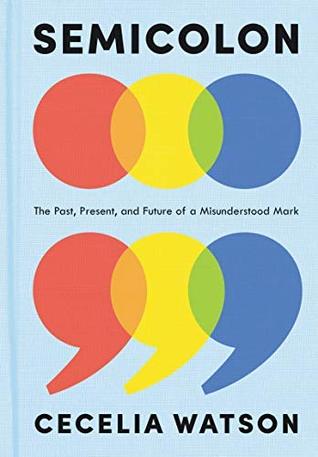More on this book
Community
Kindle Notes & Highlights
Read between
March 17 - March 27, 2020
The semicolon is a place where our anxieties and our aspirations about language, class, and education are concentrated, so that in this small mark big ideas are distilled down to a few winking drops of ink.
There was no time when everyone spoke flawless English and people punctuated “properly.” It’s important to come to grips with this historical fact, because it influences how we act in the present: after we nail down some basic punctuation history here through the story of the semicolon, I’ll show that hanging on to the old story about grammar—the mythical story—limits our relationship with language. It keeps us from seeing, describing, and creating beauty in language that rules can’t comprehend.
The entire art of expression—dead, because careless writers just couldn’t hack it when it came to punctuation. Well, I think we moderns might maintain that the art of expression gave us a few rather decent literary works even after the date of this fifteenth-century letter. But the lament of the French humanists is familiar, isn’t it? People can’t punctuate correctly, eloquence is slowly dying out. Plus ça change
This idea of punctuation as a matter of individual taste and style outlived the humanists: it stretched beyond the Latin texts that Manutius printed, crossing borders and oceans, and it survived as a way of thinking about the practice of punctuation well into the eighteenth century. When the topic of punctuation usage came up, a reader was likely to be advised that he should consider the punctuation marks analogous to rests in music, and deploy them according to the musical effect he wanted to achieve. How on earth did this idea of the writer as musician, which held on for hundreds of years,
...more
This process of moving from particular examples to general principles is known as “induction.” Faced with the shift towards an inductive method modeled on science, midcentury grammarians waffled on the proper place of punctuation in their guidebooks. Was punctuation part of orthography, the study of how a language should be written? Was it part of prosody, how language should sound? Or did punctuation fall under the heading of syntax, the study of how language should be structured? The problem sparked vigorous debate. If punctuation were to be part of prosody, how could it be taught with the
...more
Since it’s not always easy to toss out punctuation as not “part of the English language,” it’s really no wonder that entire cases regularly revolve around one tiny punctuation mark. In Ohio, a woman gets out of a parking ticket because of a forgotten comma. In the Philippines, the result of a mayoral election is voided because the court chooses to disregard a “semi-colon which the appellant views with a respect bordering on fetishism.”* Cases like these are a dime a dozen. But the stakes have sometimes been much higher than traffic tickets or cocktails after 11:00 P.M. or even election
...more
The Merchant of Venice, although fiction, illustrates a fundamental truth of the law: it turns on technicality and precision. To some degree, it must: if the law is intended to be accessible to the people to whom it accords freedoms and restrictions, those people ought to be able to understand it clearly. But no matter how technically precise and careful, the law will always be subject to interpretation. It is often the case that more than one interpretation of the letter of the law is available to us, so that justices disposed to keep bars open or close them down could both find a rationale
...more
The law is skeletal, a mere naked framework of words, and those words require interpretation for the law to become animate and to act in the world. Any time interpretation is involved (which really means: any time a human being gets involved in anything), there is the opportunity for our best and most beautiful qualities to inflect the material we are interpreting—but there is equally the opportunity for our cynicism, our racism, and our little hatreds and bigotries to be exercised through the application of laws that are at the end of the day inert tools that must be wielded by someone to
...more
Deep down, I think most rule lovers know this. I have yet to meet a rule lover who’s been able to tell me that he or she actually learned good English usage by memorizing or consulting rules. And even if memorizing rules were a good way to learn English successfully, where would knowing and using all the rules with precision actually get you? You could write perfectly “correct” English all day and still not have what most of us really want, which is style. We want our words to have impact. We want our boss to implement that great new idea, we want our texts to inspire love and our tweets to
...more
As we learn to contend with the technologies of the present moment and look for space in which to feel we, too, are really present, not pitched helplessly into the future or anchored to the past, we might find it good to look more often to a much older technology, the semicolon, notched into our sentences; to toe that line.
Even if they aren’t the basis by which we read and write, punctuation rules can’t just be unthought as though they never existed in the first place. We could not (and perhaps would not want to) go back to a time before there were punctuation rules. But maybe we can think beyond them now, to develop a new, more functional, more ethical philosophy of punctuation: one that would support a richer way of learning, teaching, using, and loving language. At the very least, by reflecting on the history of the commas, colons, question marks, and semicolons that dot our written language, we can gain some
...more


